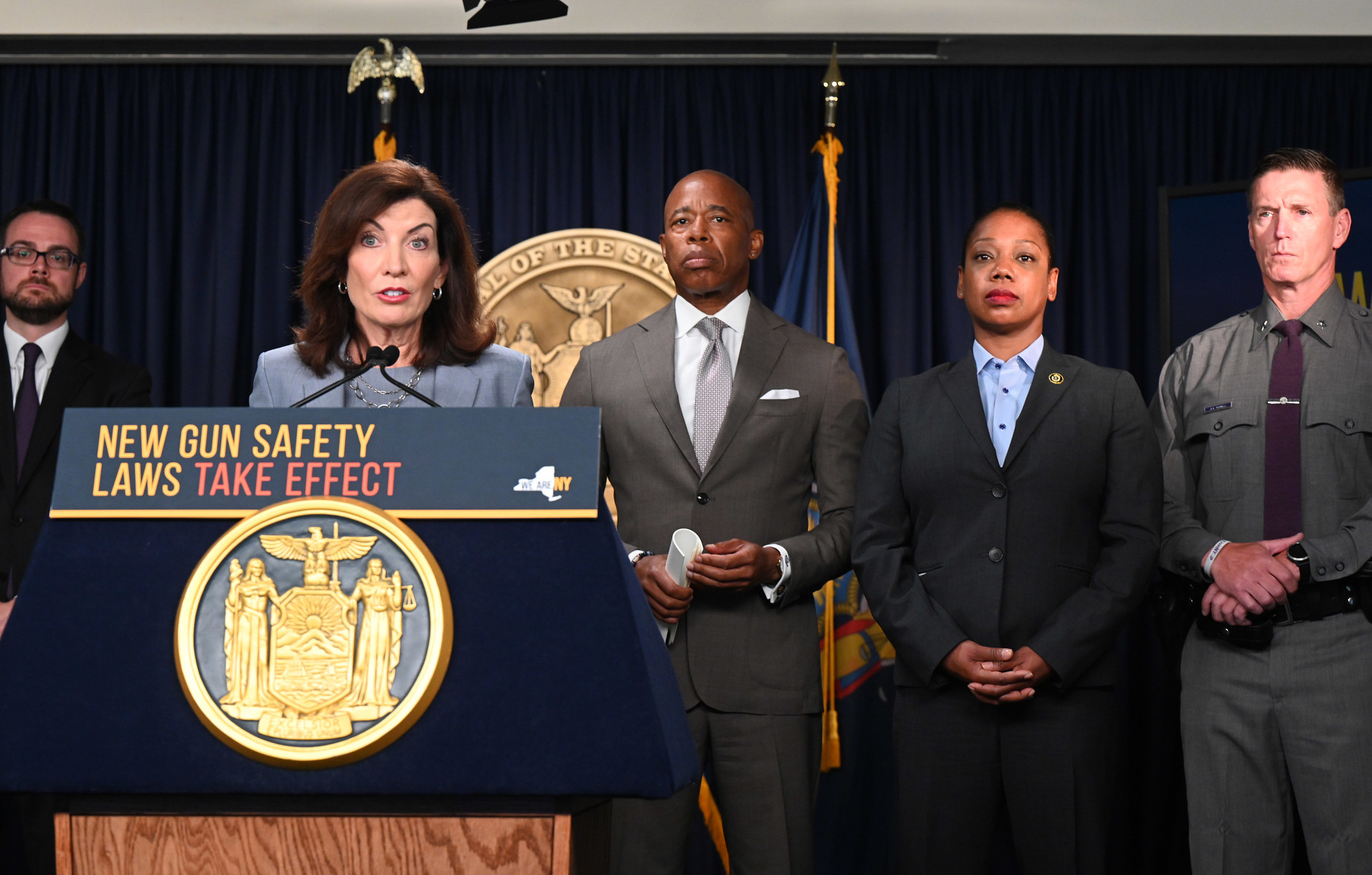EMERGENCY DOCKET
on Jan 11, 2023
at 10:37 am

New York Gov. Kathy Hochul announces the state’s new gun-control measures in September. (Gov. Kathy Hochul via Flickr)
Less than seven months after a landmark decision striking down a New York law that restricted handguns in public, the Supreme Court on Wednesday allowed the state – at least for now – to keep enforcing the gun-control law that the state enacted in response to that ruling.
In a brief unsigned order on the court’s emergency docket, the justices turned down a bid from gun owners to reinstate a ruling from a district judge who struck down many parts of the new law and ordered the state to stop enforcing them. An appeals court put the district judge’s ruling on hold, and Wednesday’s order from the Supreme Court keeps it that way while a legal challenge to the law continues in the lower courts.
There were no public dissents from Wednesday’s order. Justice Samuel Alito, joined by Justice Clarence Thomas, added a separate statement leaving open the possibility that the justices could still intervene if the appeals court does not move quickly to consider the challenge.
The New York legislature passed the law, known as the Concealed Carry Improvement Act, just eight days after the Supreme Court’s decision in New York State Rifle & Pistol Association v. Bruen. The law at the center of Bruen required anyone who wanted to carry a concealed handgun outside the home to show “proper cause” for a license. New York courts interpreted that phrase to require applicants to show more than a general desire to protect themselves or their property, but the Supreme Court – by a vote of 6-3 – deemed the scheme unconstitutional.
A group of gun owners went to federal court in September to challenge the CCIA, arguing that the state had “thumbed its nose” at the Supreme Court’s decision in Bruen by creating a new scheme that was even more restrictive. In November, U.S. District Judge Glenn Suddaby agreed and barred the state from enforcing several key provisions of the CCIA. Those provisions included a requirement that an applicant for a concealed-carry license show “good moral character,” a requirement that an applicant provide the names and contact information for family members, a ban on guns in “sensitive places” such as churches and parks, and a prohibition on guns on private property unless the property owner specifically agrees to allow guns.
On Dec. 7, the U.S. Court of Appeals for the 2nd Circuit granted the state’s request to put Suddaby’s order on hold while it appealed. That prompted the challengers to come to the Supreme Court two weeks later, asking the justices to revive Suddaby’s ruling.
The provisions of the CCIA that Suddaby put on hold, the challengers told the justices in a 28-page filing, make it very difficult to obtain a license to carry a gun in public. And even if an applicant does receive a license, they continued, the law makes virtually all places off limit to carry a gun. As a result, they argued, the new law “stands in direct defiance” to the court’s decision in Bruen, which makes clear that the Second Amendment’s guarantee of the right “to keep and bear arms” protects a broad right to carry a handgun outside the home for self-defense.
The state countered that the “good moral character” requirement is a longstanding one, rather than a replacement for the “proper cause” requirement struck down in Bruen. It also questioned whether the challengers have standing to bring their lawsuit at all: Five of the challengers have carry permits and therefore have already satisfied the “good moral character” requirement, while the sixth challenger has never applied for a carry permit. But in any event, the state told the justices that they should not step in now. Instead, the state urged the justices to wait until the 2nd Circuit has ruled on its appeal, which has been fast-tracked, and for other lower courts to apply the court’s recent decision in Bruen.
The justices turned down the challengers’ request without explanation, indicating only that the challengers’ request was denied.
Noting that the CCIA “presents novel and serious questions under both the First and Second Amendments,” and that Suddaby had concluded that the challengers were likely to succeed on several of their claims, Alito’s statement criticized the 2nd Circuit for its failure to provide any explanation of its decision to put Suddaby’s ruling on hold while litigation continues. “I understand the Court’s denial today to reflect respect for the Second Circuit’s procedures in managing its own docket,” Alito wrote, “rather than expressing any view on the merits of the case.” If the Second Circuit “does not, within a reasonable time, provide an explanation for its stay order or expedite consideration of the appeal,” Alito emphasized, the challengers can return to the Supreme Court to ask the justices to reinstate Suddaby’s ruling.
This article was originally published at Howe on the Court.





